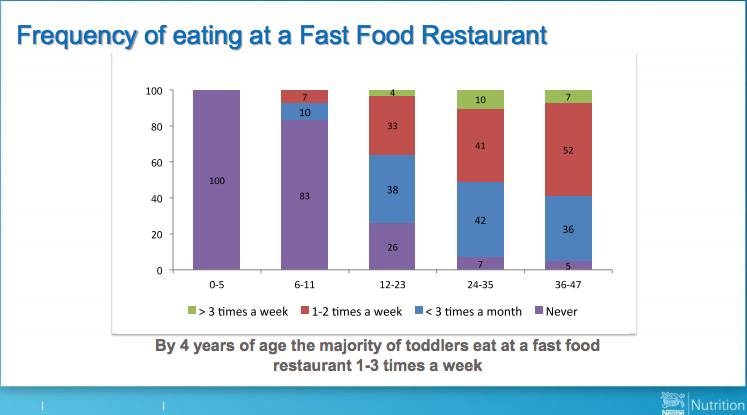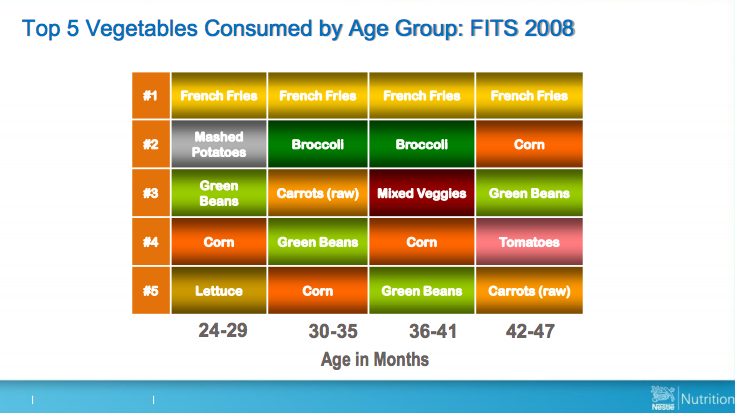I attended an intriguing lecture about early feeding, sponsored by Nestle (Gerber baby products) but was not paid to write this post. As a mother of three, I believe whole-heartedly in the importance of early feeding, and Gerber supports research about early feeding and offers some excellent educational tools for mothers.
I believe that early feeding is very important to health, and may be the most effective way to reduce the incidence of obesity. I don’t have solid evidence just yet, but there are some compelling trends showing up about the unique window of opportunity the first 1000 days of life to influence future health through nutrition. These 1000 days span the:
- 270 days during pregnancy
- 365 days during the child’s first year of life
- 365 days during the child’s second year of life
So much happens both nutritionally and behaviorally during this time frame. The mother’s diet supports the developing fetus as the infant is nurtured through pregnancy. Appropriate nutrition and the support a child receives during this time can have a huge impact on the child’s future health. Finding the sweet-spot of getting nutrition and weight gain “just right” during pregnancy is key.
The First Two Years Are Crucial

This happy 2 month old’s nutrition comes exclusively from breast milk and formula.
During the first six months, the infant gets her nutrition from either breastmilk, infant formula, or a combination of both. At four to six months, complementary feeding begins with the introduction of some developmentally appropriate table foods or baby foods. By age two, the child’s diet continues to expand and this is a time to foster independent eating.
How can the first two years of a child’s eating be so impactful? Well, poor dietary habits start in infancy. During pregnancy, proper nutrition supports normal growth and development of the fetus, but once the child is born and begins feeding, the subtle cues exchanged between mother and infant have a real impact on feeding and behavior. In other words, a mother is essentially “programming” the infant during the first two years. This programing during pregnancy through age one impacts the child’s metabolic system, immunity, and growth. From age one to two, the mother and caregivers are also providing programming for satiety (knowing when you are full), along with programming for the behavior and development of eating.
There are several modifiable dietary factors that may increase the risk of childhood obesity during the first 2 years of life:
- lack of breastfeeding
- early introduction (before 4 months) of solid foods
- high intake of sugar sweetened beverages
- low intake of fruits and vegetables
According to the Feeding Infants and Toddlers Study (FITS) average calorie and protein intake exceeded requirements for age from birth to 35 months (interestingly, hot dogs, bacon and sausage are among the high calorie foods in an infants diet age 6-24 months. There are many better choices).
In a nutshell, to be sure your baby is getting off to a good start, consider these healthy habits from birth to age two:
- Birth to four months: Provide only breastmilk or infant formula. If bottle feeding, pay close attention to when the baby is done. The bottle doesn’t have to be emptied every time.
- Four to Six Months through one year: Begin to offer small servings of baby foods or mashed table foods in the appropriate consistency and portion. Offer cooked cereal (like oatmeal), fruits and vegetables first. Avoid choking hazards. Check with your pediatrician to be sure your baby is ready.
- One to two years: Offer healthy “table foods” from the basic food groups (cooked vegetables, soft meats, fresh fruit, cheese, eggs, crackers, toast, low sugar cereals). Avoid fast food and sugary beverages during the first two years (soda, fruity drinks). At age one, the baby can begin drinking milk (begin using a cup at 6 months, and avoid bottle feeding after age one). The American Academy of Pediatrics just released a statement recommending no fruit juice during first year.
When Are Babies Actually Beginning Solid Food?
While it’s ideal to avoid solid food until after age 4 months, parents aren’t always listening to that advice. Unfortunately, many parents begin feeding solid food too early. Research has shown that many factors relate to introducing foods too early. Mothers reported several reasons for offering food to infants younger than four months:
- the baby seemed hungry
- the baby was old enough
- the baby wanted the food they were eating
- they thought the baby would sleep better
- a doctor or health care professional recommended to begin feeding
Ideally, an infant should not be provided with any food besides breast milk or infant formula the first four to six months. At that time, the infant should be able to hold his head up and sit upright, weigh at least 13 pounds, can close mouth around spoon, and can move food from front to the back of mouth.
Waiting until at least four months of age, and looking for cues that the baby is ready, supports long-term eating habits, nutrition and healthy weights. There are also behavior-related factors that increase the risk of childhood obesity:
- Lack of responsive feeding practices from caregiver
- Not paying attention to hunger and satiety (“I’m full”) cues, e.g. baby turns head away, squirms, stops feeding, etc.
- Improper sleep habits
- Lack of family meals
- Screen time
- Inadequate active play
What Are Toddlers Eating?

courtesy of José M. Saavedra, MD Chief Medical Officer Nestlé Nutrition
I’m alarmed at the amounts and types of foods being fed to children under the age of four.
- 41% of children aged two to three consume fast food one to two times per week
- 10% consume fast food more than three times per week
French Fries logs in as the top vegetable consumed by two to four year olds (along with mashed potatoes, broccoli, corn, carrots and green beans), yet most parents, when asked, think their child gets enough vegetables. I have nothing against fast food, but age one to four is an important time period to nurture healthy eating habits by introducing fruits, vegetables, and grains so the child can develop a palate for these healthy foods. Save fast food for the teen years.

courtesy of José M. Saavedra, MD Chief Medical Officer Nestlé Nutrition
Young children are also consuming too much sodium, inadequate whole grains, and too many “empty calories” (foods that are high in calorie and low in nutrition) like sweetened beverages.
Making Feeding Easier for Mothers
There’s no question that moms need guidance about early feeding. Perhaps parents do not have access to the information, a support system that encourages proper feeding, or they feel guilty or confused over what and how much to feed baby. While on the one hand there is a baby-led weaning movement going on, and a direction to “eat more whole foods”, on the other hand, there’s clearly a disconnect when it comes to feeding babies the first two years. This shouldn’t create guilt for mothers who may do well to rely on some convenience.
The baby-led weaning philosophy encourages children to eat what they tolerate, need, and then stop. It also encourages parents to be tuned into eating behaviors. But if the family isn’t already eating a healthy diet, this approach may not be the best fit.
One of the benefits of using some packaged “baby foods” is the clear direction given on labels about what age the food is appropriate for, and also how much a serving should be per age. In addition, packaged baby foods are often fortified (iron, B vitamins) which can benefit the overall nutrient profile for the child.
Don’t Miss Your Opportunity
The recent research about the importance of these first 1000 days supports how important parents are in setting up a child for successful eating throughout life. Take the time to watch the infant, look for cues that he is done, or needing more. Never force feed or use food to withhold/reward behaviors. And just like adults, infants and children also need a proper sleep schedule and some structure to function and eat properly.
Ten years ago I wrote a piece titled “Parenting Food”. The current research showing that authoritative parenting styles are most effective (responds to signals, is nurturing and structured), also applies to feeding. Being too restrictive, or too indulgent, won’t result in a child that can self-regulate and stay healthy.
Good nutrition starts early. Effective early feeding strategies will be an important part of the solution to childhood obesity.





Intriguing and informative too. Thank you for sharing.